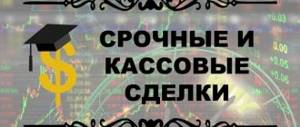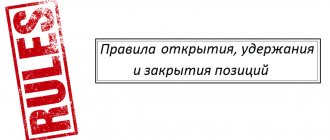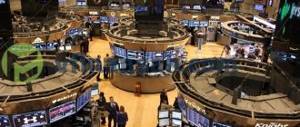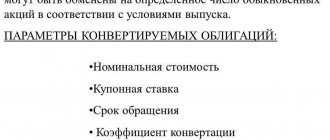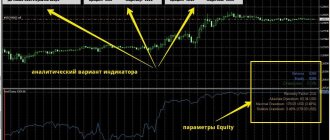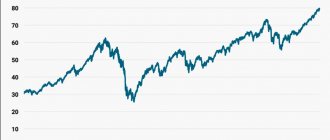The broker uses currency speculation in order to obtain a margin profit by using, at a certain point in time, the gap existing in the financial market between exchange rates and interest rates for cash and futures transactions.
This banking operation is called currency arbitrage, which is understood as speculation in foreign currency in order to obtain a margin profit by using, at a certain point in time, the gap existing in the financial market between exchange rates and interest rates for cash and futures transactions. In other words, currency arbitrage is a special method of currency transactions, the main goal of which is to make a profit and avoid potential losses of possible currencies by applying favorable conditions in the currency markets. The main principle of arbitrage is to buy a currency cheaper and sell it more expensive.
The basis for carrying out this type of operation is the discrepancy between the rates on individual currency markets, as well as the discrepancy between the rates of several means of payment on the same market.
The operation is carried out by an arbitrageur instantly in a combination of selling and buying currency. Arbitration will be more complex if the transaction involves more than one currency and several different currency markets. But the general rule in this case is the same: the source and final currencies in the arbitration transaction must be the same. Such currency arbitrage is called speculative; its goal is to obtain exchange rate profits; it is carried out by the bank at its own expense or in a share with the correspondent.
Banks participating in the foreign exchange market in modern conditions have operational information support about the state of foreign exchange markets, which entails a rapid deviation of exchange rates in different foreign exchange markets by an amount equal to (or greater than) the difference between the rates of the buyer and seller, which makes it possible to quite often practice the so-called conversion arbitrage.
In this currency transaction, the arbitrageur tries to most profitably buy or sell foreign currency (for example, when covering or collecting a debt). In this case, the bank, carrying out instructions from its clients, will strive to sell or buy the desired currency on the market where the exchange rate is the most favorable. In this case, the source and destination currencies may not be the same.
In arbitrage calculations, not only exchange rates and the state of foreign exchange markets are taken into account. Any arbitration operation is associated with expenses, such as: commission, courtage, postal and telegraph costs, etc., and in transactions with bills - also with bill stamp duty, which increase the cost of the purchased currency and reduce the proceeds from the sale.
When did the first exchanges appear?
The term "exchange" is translated from Latin as "leather bag." In the 13th century, trading of the first securities took place on the square in Bruges, where the house of the van der Burse family stood. The family's family coat of arms depicted three leather bags (ter buerse), in honor of this meeting of merchants in the square they received a derivative name - Borsa (exchange).
The world's first stock exchange was opened in 1602 in Amsterdam, where stocks, bonds were traded, and there was even exchange clearing - accounting for the obligations of the seller and buyer of securities. 100 years later, inspired by her work, Peter I opens the first stock exchange in Russia. Thus, in 1703, together with St. Petersburg, the first domestic stock exchange appeared and started operating.
What is an exchange and why is it needed?
An exchange is a market where each participant finds something of their own - tools for making money or money for a project. Companies go public to attract investment in business or for certain projects. Investors, in turn, invest money in stocks and bonds of companies to make a profit.
Each transaction on the stock exchange is registered and executed by a professional participant. To make a transaction on the exchange, you need to place an order. Only legal entities that meet certain requirements can do this. One such person is a broker. The broker acts as an intermediary between the investor and the exchange. The investor submits an instruction for a transaction to the broker, and the broker, guided by this instruction, enters into transactions on the stock exchange. So he plays the role of an intermediary and allows private individuals to enter the exchange.
When registering in the Gazprombank Investments application, the user, although he selects instruments in the catalog independently, entrusts the transaction to a broker - broker GPB Investments LLC.
For example, the owner of a car wash decided to raise money to expand the business and build a car service center. After going through a certain procedure, he issued bonds to raise money, and investors, having invested in the bonds, lent money to the company. The introduction of these bonds to the market allowed the business to attract the necessary financing at a lower interest rate than the bank offered it, and for investors to invest money at a higher interest rate than the bank deposit suggested. The broker helped to complete and register the transaction.
Financial instruments offered to private investors by the Moscow Exchange. Source: moex.ru
The activities of exchanges in various countries are regulated by law and undergo strict inspections and licensing procedures. The operation of the exchange is monitored by a regulator - a body, commission or other organization, depending on the legislation of the country in which the exchange is located. The regulator monitors compliance with the law and issues licenses to brokers.
The stock market regulator in Russia is the Central Bank of the Russian Federation. It is critically important for investors to check that all transaction intermediaries have valid licenses, otherwise there is a high risk of suffering from scammers, not buying shares and losing money. These documents can be found on the official websites of brokers - if the license number or the document itself is difficult to read, most likely you are dealing with scammers. A complete list of trading participants is available on the official website of the Bank of Russia - in the “Check organization” section you can check the company and its license.
Relations between participants and the operating mechanisms of the exchange itself are regulated by the Federal Law “On the Securities Market” and the Federal Law “On Organized Trading”.
What can you buy on the stock exchange?
Securities, bonds, units of investment funds (UIFs) and other financial instruments are traded on the stock exchange. Each exchange has its own set of instruments: for example, on the Moscow Exchange you can buy currency and various securities, and on the St. Petersburg Exchange foreign securities and goods are traded - from construction materials to aquatic biological resources and their processed products.
Financial instruments and data important for investors are located on the main page of the St. Petersburg Exchange website. Source: spbexchange.ru
Depending on the instruments traded, exchanges are:
- commodity - they trade raw materials, products, grain, energy, oil, etc.
- stock exchanges - stocks, bonds and depositary receipts are traded on them.
- foreign exchange - make it possible to buy and sell currency.
- futures - enter into futures contracts on currencies, stock indices, commodities and raw materials.
- options - they trade options on currencies and other instruments.
But there are also universal ones - they combine trading in different instruments, for example, in different sections. In Russia, the universal exchanges are Moscow and St. Petersburg.
Largest exchanges in the world
In total, there are about 250 platforms in the world where you can buy or sell financial instruments. The five largest exchanges in the world are:
- New York Stock Exchange. It is considered the largest in terms of turnover; its market capitalization, that is, its value on the market, is $25.5 trillion. Here the most famous stock indices are determined - indicators of price changes for certain groups of securities, for example, the Dow Jones, NYSE Composite and NYSE ARCA Tech 100 Index.
- NASDAQ is another American exchange. It specializes in high-tech companies, and the number of shares traded there is already more than 3,200.
- The Japanese exchange group is the leader of the Asian exchange sector. It operates various exchanges, including the Tokyo Stock Exchange and the Osaka Securities Exchange.
- The Shanghai Stock Exchange is the leader among exchanges in mainland China. By the way, there are only two types of shares on the exchange: A and B. A-shares are traded for yuan, and B-shares can only be purchased by non-residents and for US dollars.
- Euronext NV is a pan-European stock exchange with offices in Belgium, the Netherlands, Portugal and France. On the exchange you can buy not only shares and derivatives, but also receive clearing services.
The daily trading volume of the New York Stock Exchange is about $1.5 trillion, while the NASDAQ trades daily at $1.3 trillion.
Essence
To simplify the understanding of a forward contract, we can consider that a forward transaction is an operation where the object is not a product, but actual obligations and rights in relation to formalized standard agreements.
Futures contracts are sold only subject to cash settlement. The quantity and quality of assets to be supplied in the future are agreed upon in advance.
The main purpose of forward transactions is to eliminate financial risks. This occurs due to the fixation of asset prices when executing the contract. Participants in the transaction receive certain guarantees of the execution of the agreement. The seller minimizes price losses, the buyer receives rights to the purchased assets with a fixed price in order to obtain further profits.
Example of forward transactions : option, interest rate swap, warrant, convertible bond, agreement on a future interest rate, etc. Let's take a closer look at the types.
What exchanges are there in Russia?
Stock exchanges in Russia are the Moscow (Moscow Exchange), St. Petersburg and St. Petersburg Commodity and Raw Materials Exchange. You can use them to buy or sell Russian and foreign securities, currencies and precious metals. Petroleum products, oil, gas, and timber are traded on the commodity exchange. The daily trading volume of the Moscow Exchange is about 64.11 billion rubles, on the St. Petersburg Exchange - about 71.3 billion rubles, on the St. Petersburg Commodity and Raw Materials Exchange - about 4.157 billion rubles.
The first two are the most interesting for private investors - Moscow Exchange and St. Petersburg.
The St. Petersburg Exchange has always been considered the largest platform in Russia for trading foreign shares. But in August 2021, Moscow Exchange began offering them. On the Moscow Exchange, settlements on securities of foreign companies are carried out in rubles, on the St. Petersburg Exchange - in foreign currency.
Who's who on the stock exchange
Professional and ordinary participants make transactions on the exchange.
Professional
Are licensed to perform operations. These are brokers, trustees, clearing houses and regulators:
- A broker
is an intermediary between the exchange and the investor. He enters into an agreement with the buyer of shares and acts on his instructions. - A trustee
is a company that controls an investor's portfolio by agreement with the investor. - The clearing house
is the central counterparty for all transactions. - Federal Treasury
- conducts operations on the stock market and provides liquidity. - A regulator
is an organization that monitors the legality of transactions. It also issues licenses to professional participants.
Regular participants are issuers and private investors.
They can enter the exchange only through professional trading participants.
- Issuer
- a company (city or country) that issues shares or bonds to raise capital. - Investor
- a legal entity or individual who invests capital in shares to make a profit
Investors can be qualified or unqualified: this determines the range of financial instruments available for purchase.
How stocks and bonds appear on the stock exchange
Companies go to the stock exchange for money, investors go to the stock exchange to make money. When a business achieves success, the owners of these companies look for tools to attract additional funding. Raising money on the stock exchange is often easier than borrowing from a bank - by issuing bonds on the market, a company can borrow more than a financial institution can provide. The term of the loan can be determined by the issuer himself, without being tied to the bank’s conditions.
A similar process occurs with shares: companies carry out a certain sequence of procedures in accordance with the legislation of the Russian Federation and enter an IPO - the first public offering of shares.
An investor who buys shares of a company becomes a shareholder and receives dividends if the issuer pays them. The bond buyer lends money to the company, waits for the debt to be repaid, and receives coupon payments—essentially, interest on the deposit. Both shares and bonds can be sold on the stock market, but not at par, but at the market price.
Functions
The purpose of the stock market is as similar as other types of markets - to help buyers and sellers find each other.
Let's consider additional, but no less important functions of the stock market:
- Concentration of available funds. After the meeting of the stakeholders, the need for this important function arises as the stock market provides investors with a wide range of options to invest the funds accumulating in the market.
- Distribution of funds. Concentrated savings are distributed into various economic sectors, moved from one organization to another, and also make it possible to eliminate the state budget deficit through the issuance of government bonds.
- Attracting foreign capital. If an interesting and promising enterprise becomes a participant in the Russian market, it will be able to attract financial resources from a foreign investor for its own development in order to use it on the domestic market. Such an investment will benefit not only the company itself, but also the residents of the Russian Federation, for whom new jobs will appear.
How investors make transactions on the stock exchange
To gain access to trading, an investor must enter into an agreement with an intermediary - a broker or trustee. Only through them can a non-professional market participant make transactions.
Broker
carries out operations on the stock exchange on behalf of the investor. Money for transactions and commissions for services are debited from his account. The broker himself pays income tax for the investor - 13%. The activities of brokers in Russia are controlled by the Central Bank of the Russian Federation. Typically, exchange websites list partners through which investors can access trading.
Trustee
differs from a broker in that it develops an investment strategy for the investor. For example, what financial instruments to buy and for what period. In accordance with the strategy, the manager concludes transactions. For his actions, he retains a commission in addition to taxes and transaction fees. However, he does not guarantee profit: sometimes his tactics can be unprofitable.
The investor is also required to open a brokerage or individual investment account from which he will make transactions. It will display information about his transactions. The process of buying and selling securities can be schematically represented as follows:
The process of buying shares on the stock exchange. Source: gazprombank.investments
Forward contract
The forward specifies obligations to purchase/sell an object at a predetermined cost after a specified period of time. Counterparties directly participate in concluding a transaction, and dealers act as intermediaries, so the forward belongs to the over-the-counter category.
There are forwards that do not specify the estimated date of settlement of the agreement. These are called open date forwards.
Forwards are divided into delivery and settlement. Delivery is completed once the underlying asset has been delivered and full payment has been made. Another forward contract - settlement - is executed without delivery of the asset.
What are stock indices
The securities of many issuers are traded on the stock exchange. It is impossible to track all the movements that occur with them. To assess the general state of the market and predict trading results, experts came up with stock indices. They show how much the value of a particular group of shares has changed on average.
The Moscow Exchange Index - IMOEX - is an indicator of the state and dynamics of the market for a certain group of securities. The index repeats the dynamics of securities: if the prices of the shares included in it rise, then the index goes up. The list of issuers included in the index is available on the Moscow Exchange website.
Stock indicators are calculated for a certain number of securities for countries, industries and financial instruments. The larger the issuer and the more frequently its shares are traded, the greater the company's weight in the index.
Indices are divided into international and national. On the Russian market, the main ones are the Moscow Exchange index in rubles and the RTS index in dollars. Shares of issuers represented in both indicators have the greatest liquidity - the ability to quickly sell at the market price. In American - Dow Jones index, S&P, NASDAQ indices.
Dynamics of the American NASDAQ index for the maximum trading period. Source: investing.com
There are also certain trends in the stock exchange that you can hear about in podcasts and read on forums. Trends are a market condition in which the price of financial instruments moves in one direction. The two most important are bearish and bullish.
- Bearish - a situation in which market participants, bears, do not believe in market growth. They play to reduce it, making money on the fall of shares;
- Bullish - a situation in which market players, bulls, on the contrary, are waiting for the market to rise. They bet on its rise, benefiting from the rise in price of securities.
On the insvesting.com portal, users can make forecasts about stock market trends based on the personal expertise of other investors.
Types of prices for transactions with real goods
Types of prices for transactions with real goods, also called types of prices for real goods, include spot and forward. They apply to the relevant types of transactions for the purchase and sale of goods.
The spot price is the price of a product that is offered for purchase at a given specific moment. This is the cost that the buyer will pay to the seller if he agrees to the deal immediately.
For items with a delivery time of more than a month, a forward price is often used. This is the price taking into account deferred delivery, when the goods are paid for in advance, but for objective reasons its sale cannot be carried out close to the time of payment.
What are the risks when trading on the stock exchange?
Investments in securities are not insured by the state, so investors always risk losing capital. This may happen due to a decline in the value of shares or bankruptcy of companies: for example, the company that issued the bonds will not be able to repay the loan.
To prevent such a scenario, you should diversify your portfolio: buy different financial instruments from different issuers, as well as analyze the activities of companies and follow news that affects the price of shares.
Purpose and process of issuing securities
Issuers produce securities: companies, the state or its individual entity, and even a city.
The purpose of issuing these assets is to raise funds. Before releasing assets, the issuer analyzes the volume of missing resources and determines their form.
An organization can receive money in several ways:
- by issuing bonds - debt receipts, in which investors provide the issuer with their own funds, subject to receiving a certain percentage;
- by issuing shares - securities that give the buyer the right to co-own the company.
The organization sets the parameters of assets: quantity, nominal value and period of its validity. Next, state registration of the issue is carried out by making an entry in a special register.
ATTENTION!
Securities that have passed the registration procedure are placed on the stock exchange for purchase by investors.
